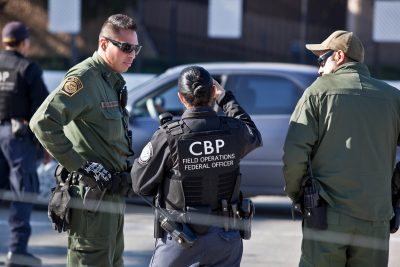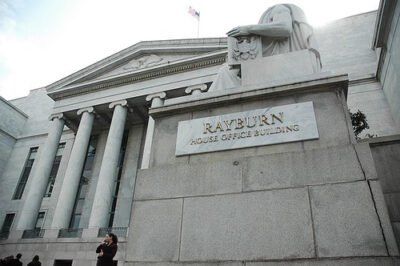Interior Enforcement

Arpaio Only One Smiling in Maricopa County
Video by America's Voice. NOTE: This story first appeared in the Huffington Post. Smile, You're Under Arrest"--that's the name of a new reality TV show starring none other than Sheriff Joe Arpaio of the Maricopa County Sheriff's Office (MCSO). Yet Maricopa County citizens aren't smiling as Arpaio's tactics have wreaked a lot of havoc, and fought little crime. Arpaio has transformed his police department into an immigration-enforcement agency, gaining international notoriety in the process. Armed with a 287(g) agreement with Immigration and Customs Enforcement (ICE) and a mandate to enforce immigration law, Arpaio has taken the pursuit of undocumented immigrants to "unconstitutional extremes." Read More

ICE Partners With San Diego County, Seeks Presence in 3,100 Jails
San Diego County recently announced that it would soon be partnering with ICE and dedicating its energy to identifying immigrants in jail for deportation.ICE unveiled its new program – The Secure Communities Program – in March 2008.It gives jails access to ICE and FBI databases so that they can identify inmates who lack legal status or have a criminal history and then turn them over to ICE for deportation. Through this new initiative, ICE plans to eventually have a presence in every one of the 3,100 local jails throughout the U.S. While removing dangerous criminals from the U.S. is an understandable goal, Secure Communities appears to be the latest in ICE’s attempts to get states and localities to do their jobs for them.The best known of these is the 287(g) program, through which local police are trained by ICE, and agree to jointly enforce immigration laws. Read More

NC Sheriff Steve Bizzell Trashes Immigrants
It's no surprise that half of all Latinos, immigrant and non-immigrant, are saying that their situation in this country is deteriorating when highly-regarded and powerful officials like Sheriff Steve Bizzell of Johnston County in North Carolina say such denegrating things as "Mexicans are trashy" and that "All they do is work and make love." Jennifer Rudinger of the ACLU told the Associated Press: "[Bizzell's comments] go from simply stating opinion to constituting illegal racial profiling if these opinions are reflected in practice...It's one thing to think something and say something. It's another to have that kind of bias carried out and enforced." North Carolina has put into action a federal program known as the ill-fated 287(g) program which gives specially trained police officers to enforce federal immigration law. The program has had a startling price tag--both financial and social--in communities like Maricopa County, Arizona where the The Sheriff’s Office created a $1.3 million deficit in just three months as a result of its 287(g) agreement. Read More

Congress Event Perpetuates Myth that Immigrants are Criminals
This morning, Republican members of the House Judiciary Subcommittee on Immigration perpetuated the persistent myth of immigrant criminality with their event on “The Toll of Illegal Alien Criminals on American Families.” The event was spearheaded by Lamar Smith (R-Texas), Steve King (R-Iowa) and Howard Coble (R-NC). Tensions ran high as witnesses ranging from bereaved family members to the President of the Houston, Texas, Police Officers’ Union, to the Chairman of the Prince William County Board of Supervisors made the case that the loss of innocent citizens is a direct result of not cracking down on “illegals” in the US. The witnesses demanded policies that would make life so miserable for immigrants, that they would be driven to self-deport. One witness even received enthusiastic applause after suggesting birth-right citizenship be repealed. Read More

Phoenix Mayor Demands Immigration Reform at Police Conference
This week the Police Foundation sponsored a two day conference, “The Role of Local Police: Striking a balance between immigration enforcement and civil liberties." One of the highlights was a speech by Mayor Phil Gordon of Phoenix, a vocal supporter of immigration reform and opponent of the antics of Sheriff Joe Arpaio in Maricopa County. Gordon understands firsthand both the impact that undocumented immigration has had on his community and the impact that using the wrong policies to try to fix a very real problem have had. Drop houses, kidnapping operations, smuggling, and trafficking are all issues the Phoenix has to deal with on a daily basis, and they are direct results of the illegality wrought by the current broken immigration system. He also spoke about costs of enforcing immigration law -- the financial costs, the public safety costs, and the human costs. Read More

Balancing Federal, State, and Local Priorities in Police-Immigrant Relations
Since the terrorist attacks of September 11, 2001, changes in federal, state, and local law-enforcement priorities and practices have had a profound impact on America’s Muslims, Arabs, and South Asians. Some of these policy shifts applied exclusively or primarily to those communities, such as the federal “special registration” program, selective enforcement of immigration laws based on national origin or religion, and expanded federal counter-terrorism efforts that targeted these communities. At the same time, a wide range of ethnic groups have been affected by the use of state and local police agencies to enforce federal immigration law, and the aggressive use of detention and deportation authority for even minor infractions and technicalities. Across the United States, police departments and Muslim, Arab, and South Asian communities have responded with varied approaches to the new post-September 11 reality. In some cities, serious tensions between law-enforcement agencies and immigrant communities have arisen. Other cities have taken steps to alleviate these tensions and promote dialogue and cooperation with immigrant communities. This report evaluates the challenges and successes of recent trust-building efforts between immigrant communities and local police departments, and the responses of each to new and proposed policies that threaten those efforts. Using the experiences of Muslim, Arab, and South Asian communities, the report offers insights that apply to much broader populations. It draws attention to best practices and policy solutions such as the creation of more effective channels for public dialogue and communication, public education campaigns, officer training and recruiting programs, and forms of cooperation between police and community organizations. Read More

Money for Nothing: Immigration Enforcement without Immigration Reform Doesn’t Work
While the U.S. government has poured billions upon billions of dollars into immigration enforcement, the number of undocumented immigrants in the United States has increased dramatically. Rather than reducing undocumented immigration, this enforcement-without-reform strategy has diverted the resources and attention of federal authorities to the pursuit of undocumented immigrants who are drawn here by the labor needs of our own economy. Read More

The Social Security Administration No-Match Program: Inefficient, Ineffective, and Costly
This report provides an overview of SSA’s no-match letter program, a summary of DHS’s new supplemental proposed rule regarding no-match letters, and an overview of the unintended consequences of no-match letters that are sent to employers. Read More

Administration Announces New “No-Match” Regulations: DHS Regs Pass Burdens to Social Security Administration, Small Businesses, and Citizens
Provides a summary of the new proposed "no-match" regulations and their harmful impact on workers, employers, and the Social Security Administration. Read More

Targets of Suspicion: The Impact of Post-9/11 Policies on Muslims, Arabs and South Asians in the US
In response to the terrorist attacks of September 11, 2001, the U.S. government began a campaign of aggressive immigration enforcement targeted at Muslims, Arabs and South Asians. Rather than first seeking to identify suspected terrorists, the government initiated harsh law enforcement actions against whole communities with the hope that some of those caught might be terrorist suspects. Read More
Make a contribution
Make a direct impact on the lives of immigrants.
